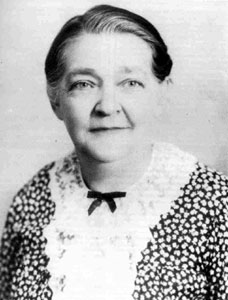
Kate Bradford Stockton
Kate Bradford Stockton, a socialist and the first woman to run for governor in Tennessee, was born in Stockton, California, in 1880. She was a direct descendant of William Bradford, second governor of Plymouth Plantation. Her grandfather, Arthur Bradford of Pennsylvania, was appointed consul to Amoy, China, by Abraham Lincoln. After an unsuccessful attempt at ranching in California, the Bradford family moved in 1884 to Fentress County, Tennessee, where Kate’s father took a job with the railroad. Kate attended a local subscription school founded by the Stockton family and went to Overton Academy in Livingston, where she earned a teaching certificate. She continued to teach after her marriage to Joe Kelly Stockton in 1904 and the birth of four daughters. Despite the press of her domestic duties, Kate was an early advocate of birth control and an outspoken feminist.
Joe Kelly Stockton was active in local politics, and by 1920 both he and Kate had embraced socialism. Labor activist Myles Horton boarded with the Stocktons when he worked for the YMCA in the early twenties. After a trip to Scandinavia, Horton decided to open a cooperative school in America, for which the Stocktons offered Horton several hundred acres of land. Horton filed the charter for Highlander School in Fentress County, but after one summer the school was moved to Grundy County. Horton first encouraged Kate Stockton to run for governor.
The Socialist Party in Tennessee consisted of only a few hundred members. Kate Stockton became the party’s candidate for governor in 1936 largely because no one else was willing to run. The only political experience Stockton had was as state committee chair. The fifty-six-year-old candidate frequently drew on her teaching experience to explain the economic problems of the United States to women unfamiliar with economic theories and convince them to vote for Socialist candidates. The press focused on her small stature, neat appearance, and correct speech rather than her message for radical change. It was no easy task to run a statewide political campaign in Tennessee during the 1930s. The lack of paved roads in Fentress County forced Stockton to ride a horse to Cumberland County (ten miles) and catch the train to other parts of the state to meet her speaking engagements. Since the Socialist Party could not provide financing for the campaign, Stockton began with a personal contribution of five dollars and asked other supporters throughout Tennessee to send one dollar a month to support the campaign. This fund raising provided two mimeographs and highway signs. A red sound truck furnished by the national office was used extensively to transport Stockton to her speaking engagements in major cities throughout the state. After a well attended rally in Memphis, she was warned about her denunciation of Democrat Gordon Browning. The Shelby County sheriff indicated he could not protect her from ripe tomatoes or other missiles that might be thrown at her if she continued her socialist message. Undeterred, Stockton spoke whenever and wherever she could attract an audience. Stockton knew her chances of winning the governorship of Tennessee were improbable, if not impossible. She received only 3,786 of 410,814 votes.
Kate Stockton returned to her home after the election but remained active in politics. She was in Birmingham, Alabama, in 1938 with Eleanor Roosevelt, Mary McLeod Bethune, Myles Horton, and others for the organization of the Southern Conference for Human Welfare. The group met again in 1940 and 1942. By this time the FBI was closely scrutinizing Stockton and others. Horton was under constant pressure from national and local authorities for his political activism, but Stockton was able to return to relative obscurity in Fentress County. In 1939 she wrote a short book explaining the advantages of cooperative living, and at the time of her death in 1969 she was working on a similar book for senior citizens. Stockton was buried near her husband in the Stockton cemetery in Fentress County.



